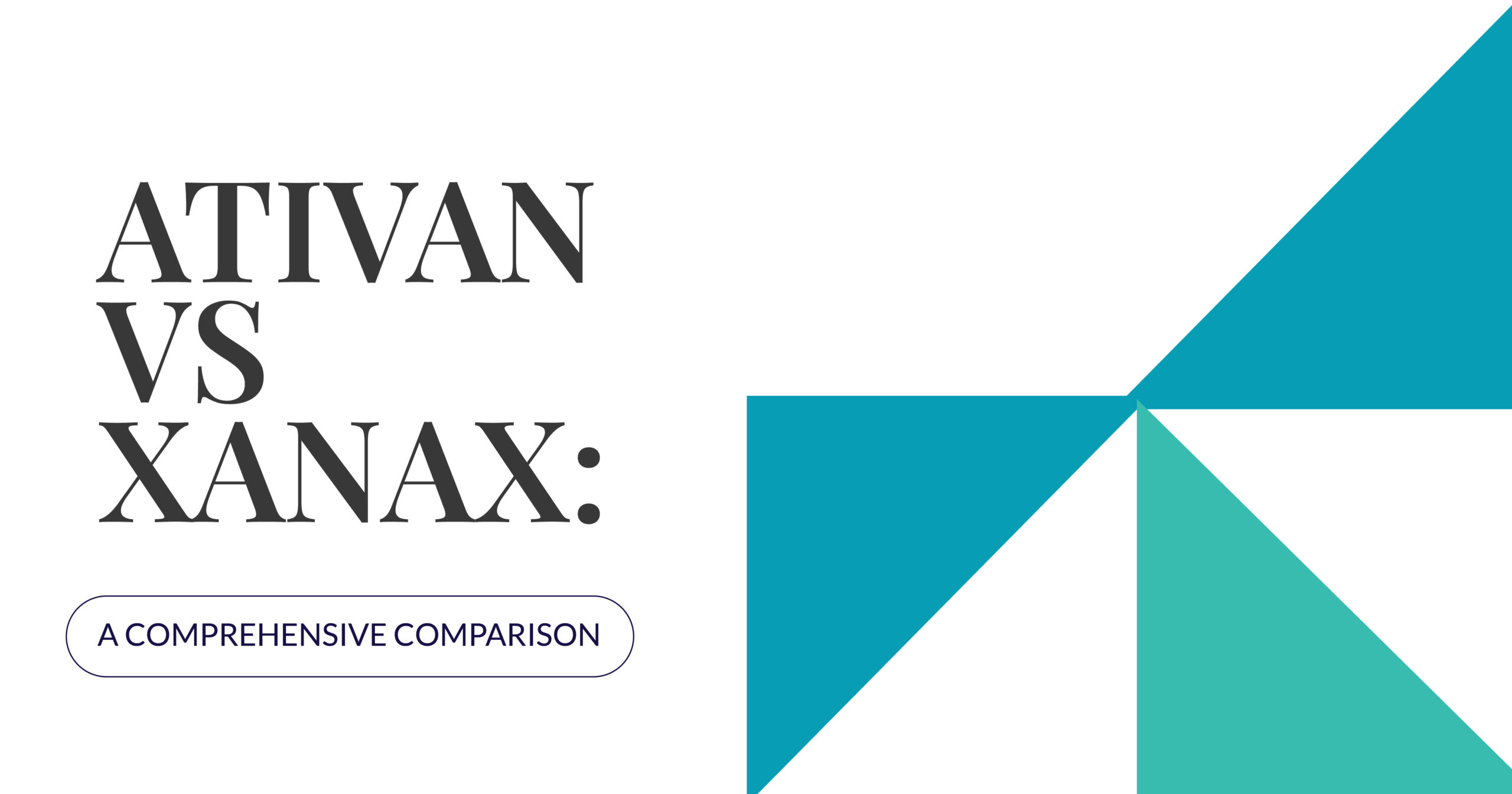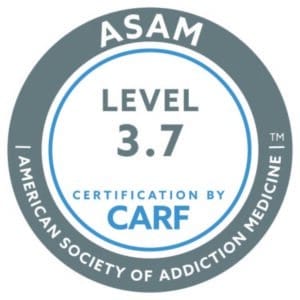It is important to trust your medical provider when they prescribe you specific medications provided that they examined your health, learned all they needed about your medical history, and came to the conclusion your symptoms can be alleviated with the help of a particular prescription drug. When it comes to severe anxiety, Xanax and Ativan are great options – they have been found extremely effective for numerous patients who struggle with anxiety, insomnia, depression, and agitation.
In this article we will compare Ativan vs Xanax, take a look at what these prescription drugs can do for patients with anxiety disorders, and explore the potential adverse effects of these medications every individual must know about before they start taking these drugs.
How Ativan Works for Anxiety
Ativan – also known as lorazepam – is a prescription drug that slows down the activity in the person’s nervous system and creates a calming effect in the individual’s brain. There is an obvious sedative effect – instead of worrying, pacing around the room, or being unable to calm down, a person feels less anxious and threatened by whatever it is they fear.
Another helpful effect of Ativan is its ability to treat insomnia triggered by anxiety disorder – most people with severe anxiety cannot fall asleep at night, cannot sleep more than a few hours in a row, or wake up early in the morning unable to sleep some more which makes Ativan a great option for people who need to rest and relax both mentally and physically.
The Effects of Xanax on Anxiety
Xanax – also known as alprazolam – will affect the receptors in your brain to slow down the brain activity that causes you to experience panic and stress. You will no longer feel agitated, anxious, and frightened despite occasional drowsiness and lightheadedness that some patients cannot avoid.
Note that patients are not supposed to take Xanax for years – this is a short-term solution to anxiety and related mood disorders so while you depend on this medication to keep you calm and steady, it is a good idea to consider talking therapy as well as make meaningful changes in your life to see how you can deal with anxiety and cumulative stress without pills.

Side Effects of Ativan Vs Xanax
Here is a brief overview of the side effects of Ativan use:
| Side Effects of Ativan | Description |
| Short-Term Consequences | You might feel dizzy, tired, weak, restless, and unsteady. Some of the initial physical side effects include nausea, diarrhea, loss of appetite, constipation, and vision problems |
| Serious Consequences | Make sure you tell your doctor about the following symptoms right away so that they replace Ativan with an alternative medication – inability to stay still, tremors, swelling of the eyes or face, non-stop itching, and heart arrhythmia all warrant a visit to a medical facility. If you continue to use and misuse Ativan against the instructions given to you by your physician, you increase the likelihood of hallucinations, suicidal ideations, respiratory problems, and coordination issues |
| Withdrawal and Addiction | Unfortunately, you can get addicted to Ativan – even if you stop taking this medication trying to lessen the risks, the withdrawal symptoms may be too severe and lead to addiction that is much harder to deal with. If you cannot sleep at night, feel irritated and nervous, and there are muscle cramps you cannot explain, it means you are going through withdrawal and need medical attention |
If you were prescribed Xanax, you must familiarize yourself with the risks of its use and misuse as well:
| Side Effects of Xanax | Description |
| Short-Term Consequences | Memory problems, drowsiness, nausea, hypotension, and coordination issues may bother you for a while but if these side effects do not last long, you can tell your doctor about them during the next appointment without the need to schedule an emergency visit |
| Serious Consequences | Sadly, there may be serious side effects such as hallucinations, seizures, acute liver failure, tremors, and confused thoughts. If Xanax causes you to feel this way no matter how long you have been taking it, it must be reported to the doctor immediately |
| Withdrawal and Addiction | If you decide to stop taking Xanax without consulting with a physician first, you may experience withdrawal symptoms such as severe anxiety, hyperventilation, sleep disturbances, excessive sweating, and lack of appetite. Addiction can become a problem for you if you increase the dosage on your own accord – seek professional help as soon as you understand your cravings for Xanax become too much to bear |
Which Conditions Are Treated by Ativan and Xanax
Ativan is a great antianxiety medication – it helps people with anxiety disorders and can reduce the frequency of panic attacks. Healthcare providers are free to decide what other applications are possible but the main goal of this drug is to create a calming effect on a patient’s nerves and brain which helps them to get rid of the most severe manifestations of anxiety. Ativan has also been found highly effective in the treatment of seizures – while it is rarely a standalone method of treatment or the first medication a physician would think of, it has its benefits for people diagnosed with epilepsy.
The main purpose of Xanax is to target the symptoms of anxiety whether it is the only problem that bothers the patient or the manifestations of anxiety were triggered by chronic depression. It is a very helpful drug for people who have phobias related to scary spaces and situations – for instance, you can alleviate the symptoms of agoraphobia and feel more confident outside forgetting about the shame and embarrassment you would usually feel.
Dosage Differences Between Ativan and Xanax
On average, you are supposed to take 0.25 to 0.5 milligrams of Xanax three times a day every day. The usual Ativan dosage range varies between two to six milligrams – you can divide them into two or three doses. A doctor will prescribe you one of these medications at first – if one of them fails to do the job, they will advise you to take a different medication while carrying out a benzodiazepine comparison in terms of their effects on your body and psyche.
Consult Healthcare Professionals About Anxiety Medication at Opus Health
Anxiety medication is a powerful therapeutic approach whether you continue to go to therapy and benefit from more conventional methods of treatment or not. Despite all the benefits of Xanax and Ativan, the adverse effects can be severe and unpredictable – moreover, some individuals cannot manage their symptoms with these medications which means their healthcare providers need to find an alternative way to help them.
If you cannot deal with your anxiety disorder relying on prescription drugs you are currently taking or you want to break free from dependence on any kind of antianxiety medication, reach out to Opus Health – together we can pick the right treatment for you and help you get your life back on track.

FAQs
What are the differences in sedative effects between lorazepam and alprazolam when used as anti-anxiety medications?
Sedative effects will be more evident quicker with Xanax but will also dissipate at a faster rate when you are taking Ativan. Ativan will result in sleepiness which makes it a great prescription drug of choice for people who struggle to fall asleep and patients who need to be sedated before the surgery.
How do withdrawal symptoms from benzodiazepines like Ativan and Xanax compare?
Xanax withdrawal is a more challenging experience than Ativan withdrawal. Due to the fact that Xanax has a shorter half-life – it leaves the system quicker – the symptoms of withdrawal may manifest within a few hours making it very hard for a person not to relapse. Ativan will lead to less severe symptoms, and the detoxification process is a less complicated experience.
Can lorazepam and alprazolam be used interchangeably for short-term anxiety relief?
You should not experiment with antianxiety medication if you run out of Xanax or Ativan – the best thing you can do is to consult with your doctor before you take any kind of prescription drug you were not approved to use earlier. Still, when it comes to these two particular medications, half a milligram of Xanax is equivalent to one milligram of Ativan so some physicians will prescribe both of these drugs to people who can benefit from them.
What factors should be considered when choosing between prescription anxiety drugs like Ativan and Xanax?
Xanax is a better option if the patient needs to feel the effects of the drug right away – for instance, if you are suffering from panic disorder and panic attacks occur with no prior warning, Xanax is the best solution. Ativan, on the other hand, is more efficient in the treatment of anxiety disorder due to its slower onset, and unlike Xanax, it helps with moderate and severe seizures.
How do Ativan and Xanax differ in treating various anxiety-related conditions?
Xanax will act faster but last shorter as opposed to Ativan. If you prefer to take pills less often, Ativan would be a better bet – however, if your goal is to alleviate the manifestations of any anxiety-related condition quicker, ask your doctor to prescribe you Xanax.












